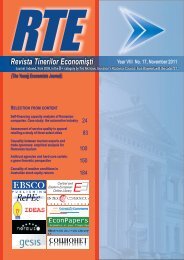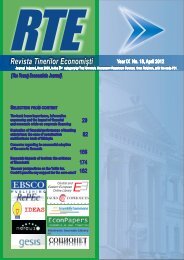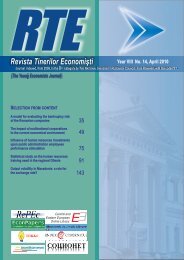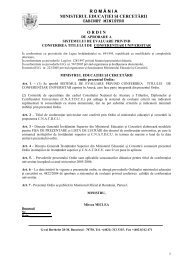Revista Tinerilor Economiºti (The Young Economists Journal)
Revista Tinerilor Economiºti (The Young Economists Journal)
Revista Tinerilor Economiºti (The Young Economists Journal)
Create successful ePaper yourself
Turn your PDF publications into a flip-book with our unique Google optimized e-Paper software.
Management – Marketing - Tourism<br />
pains.” 42 If we ad all the pleasures produced by an action and all the displeasures (in<br />
general, an action has consequences of both ways), and then we subtract from the sum<br />
of pleasures the sum of pains, we will obtain what is called „the utility of that action”<br />
(Mill, 1994). A correct moral decision is that which produces the greatest utility<br />
confronted by the possible alternatives.<br />
<strong>The</strong> decision in the public space is not based only on utility. <strong>The</strong> ethics of<br />
virtue or thinking style of feminist ethics (the ethics of care) may be other criteria taken<br />
into account in the decisional process. <strong>The</strong> deductive ethical theories gain a secondary<br />
role; instead the role of flair or of discernment is major. It is about an ethics of social<br />
consensus considered in analogy with the customary right or it is a „customary ethics”<br />
(Jonsen, Toulmin, 1988). For this reason we compare the new case with the example<br />
case using probable judgements of analogy.<br />
<strong>The</strong>re are not explicit rules for such analogical reasoning, but only the flair or<br />
the moral discernment of deciders, that is what Aristotle named phronesis (“practical<br />
wisdom”) (Mureşan, 2001). It is what in public politics is called taking a decision<br />
depending on an „incremental reasoning” (Lindblom, 1959), which supposes the using<br />
of analogy or similar public politics. An implemented public decision received the<br />
social consensus and gains at least practical credibility. Incrementalism offers a<br />
valuable continuity at the level of public politics and a certain type “of limited<br />
reasoning” which supposes the choice of the decisions depending on the goals already<br />
accomplished and tested in practice, which received the title of good practice due to the<br />
already accumulated experience.<br />
Another ethics applicable to the public politics and decision is that of virtue<br />
or a neo Aristotelian ethics (A.MacIntyre, R.Rorty). It is about a moral philosophy of<br />
the decision which is centred on human, not on action or rule. <strong>The</strong> interest falls upon<br />
the importance of reasons of moral action. <strong>The</strong> criterion for the public decision<br />
becomes „the moral sensitivity” (Rorty, 2006) of the actor implied in the process of<br />
public politics, a kind of empathy, of care for the other. In order to judge the moral<br />
deeds one does not need the great ethical theories, „a framework for the identification<br />
of the moral problems and for the reflection upon them” is sufficient. This framework<br />
supposes the existence of „four bunches of moral norms” (Beauchamp, Childress,<br />
2001), constituted of: principles, rules (characteristic principles), rights, virtues and<br />
moral ideals. <strong>The</strong> methodological frame is based upon principles taken from bioethics<br />
as: the principle of charity (“norms which create general benefits and their weighing in<br />
comparison with the costs and risks”) (Mureşan, 2001), the principle of autonomy<br />
respect (the respect of autonomous people’s capacities and liberty to take decisions), the<br />
principle of no harming (the avoidance of harming), the principle of justice (a group of<br />
norms for the distribution of benefits, risks, costs in a fair way).<br />
From another ethic perspective, the public decision in the public politics may<br />
subject to some criteria which strictly belong to the individuals’ rights. <strong>The</strong> rights must<br />
not be violated whatever the consequences of the realized action might be. On this<br />
dimension of rights, public politics developed their own decisional logic which aims at<br />
the respecting of rights of all those implied in the cycle of public politics who come up<br />
with a developed legislation.<br />
42<br />
Bentham apud. Adrian Miroiu, Speranţe ale eticii aplicate,<br />
http://adrianmiroiu.files.wordpress.com/2008/03/02introd-etica-aplicata.pdf, accessed at<br />
27.10.2010.<br />
113















